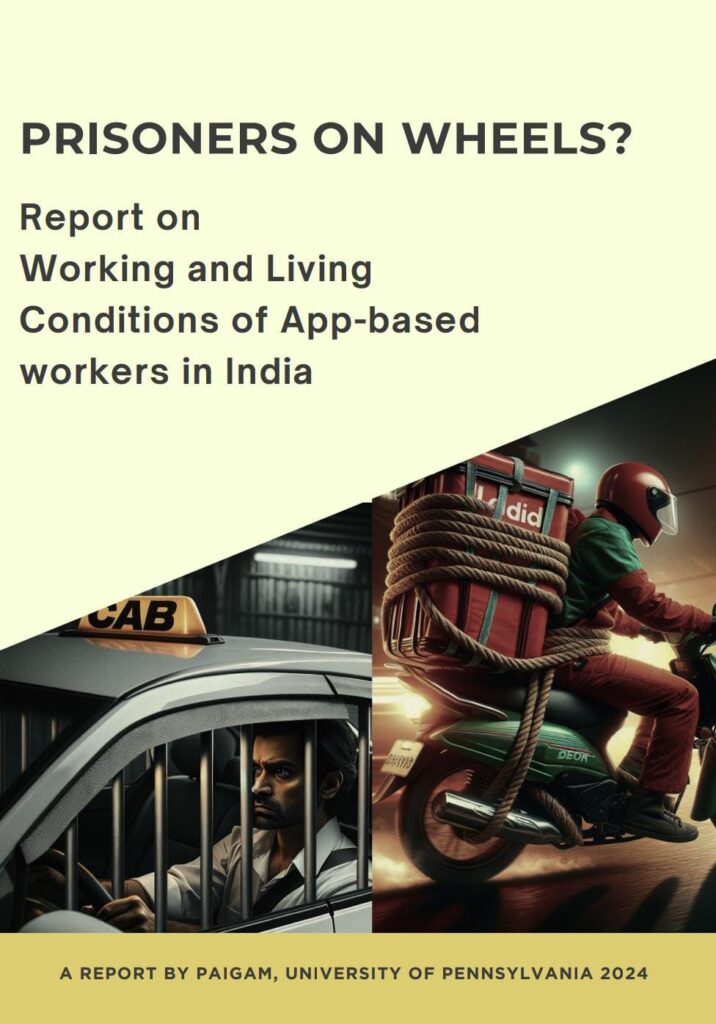Sangam Tripathy, the National Advisor of the Indian Federation of App-based Transport Workers (IFAT), boasts a 40-year tenure as a trade union activist. Recently retired as Assistant Regional Secretary at the International Transport Workers’ Federation (ITF), Asia-Pacific region, he was stationed at its Delhi Office. Since 2017, Sangam has devoted his efforts to actively mentoring, organizing, mobilizing, and networking grassroots-level app-based drivers and riders unions, associations, and self-help groups.
Following three years of dedicated groundwork, IFAT was established in December 2019. Since its inception, IFAT has played a pivotal role in amplifying the concerns of app-based drivers and riders, influencing policy changes, and advocating for legislative interventions and reforms aimed at ensuring decent work standards for these workers. Presently, IFAT represents over 35,000 app-based drivers and riders across 10 cities.
In an exclusive interaction with The Interview World, Sangam Tripathy highlights the findings of the report titled “Prisoners on Wheels: Report on Working and Living Conditions of App-based Workers in India,” launched by PAIGAM. He underscores detailed insights into the report’s recommendations and proposed solutions to address the highlighted issues. Here are the key takeaways from his interview.
Q: What are the key findings and insights revealed in the report titled ‘Prisoners on Wheels: Report on Working and Living Conditions of App-based Workers in India,’ which was launched by PAIGAM today?
A: As union members, we actively engage in work and advocacy. We take our fight to the streets, identifying and amplifying the issues faced by workers. We address these concerns by corresponding with the ministry and government authorities. However, we’ve always lacked concrete, evidence-based data to support our claims.
When union representatives voice concerns, they’re often perceived as biased. Our perspective is important, but it’s crucial to consider other viewpoints, as highlighted by Justice Shah’s remarks today. Due to our background as union members, we lack the necessary research skills and resources.
Fortunately, we have a network of supportive organizations like PAIGAM and individuals like Prof. Biju Mathew, who juggles his role as a professor and a dedicated unionist. Prof. Mathew, also the President of the New York Taxi Workers Alliance, brings valuable experience in winning legal battles for Uber drivers.
We expressed our frustration to Prof. Mathew, explaining that despite our efforts on the ground, our concerns are often dismissed as mere complaints. This study was born out of the need to substantiate our claims, especially in the face of dismissive attitudes from policymakers.
The University of Pennsylvania stepped in, offering to fund the study. They asked us what we needed, and we emphasized the importance of obtaining an accurate portrayal of the working and living conditions of workers, including cab drivers and food delivery riders. This data would provide us with a powerful tool to advocate for change.
With the report underway, we anticipate shedding light on various issues such as working hours, wages, employment terms, and safety concerns. This empirical evidence will validate the experiences of over 10,300 drivers and riders, providing undeniable proof of the challenges they face.
Our survey unequivocally exposes the stark reality: a staggering 31% of cab drivers grind for 14 relentless hours each day, while an overwhelming 83% endure gruelling 10-hour shifts. Likewise, 78% of delivery personnel toil beyond the 10-hour mark, showcasing the alarming extent of overwork prevalent in these professions.
When it comes to financial remuneration, the figures are equally distressing: a disheartening 43% of cab drivers struggle to make ends meet, earning less than Rs. 15,000 per month, while 34% of delivery persons are trapped in a cycle of poverty, barely scraping by with a mere Rs. 10,000 monthly incomes.
Furthermore, a staggering majority—72% of cab drivers and 76% of delivery persons—find themselves grappling with the daunting challenge of managing their expenses, highlighting the pervasive financial strain they face daily. Additionally, the detrimental impact of ID blocking looms large, with a striking 83% of cab drivers and 87% of delivery persons reporting adverse effects on their livelihoods.
Even in terms of compensation, the dissatisfaction is palpable: an overwhelming 80% of cab drivers and 73% of delivery persons express profound dissatisfaction with their earnings, further underscoring the urgent need for systemic reform and fairer treatment for these hardworking individuals.
Armed with this data, we aim to influence policymakers, particularly in states like Telangana and Karnataka, where discussions on legislative reforms are underway. We advocate for fair working conditions, acknowledging the complexities of the gig economy while stressing the importance of basic rights such as overtime pay and minimum wages.
Our goal isn’t to demand immediate conversion to regular employment status but rather to ensure basic decency in work conditions. We advocate for policies that guarantee fair compensation, adequate rest periods, and protection against exploitation. It’s about recognizing the value of their skills and ensuring they receive fair treatment in return.
Q: What recommendations have been outlined for policymakers within this report?
A: We’ve discussed these fundamental issues before. Some may have been unclear earlier when we mentioned transitioning them to regular employees. Our point is simple: these individuals aren’t gig workers. The evidence shows they’ve dedicated years to this work, often exceeding eight hours a day, seven days a week, with their rights controlled by the aggregator.
Consider my first ride from point A to point B. It’s not my decision; the aggregator determines it. When our fate lies in the hands of the aggregator, why can’t they recognize us as employees? We’re not asking for coverage under every law, just the basic ones like minimum wage, working hours, and social security. A new law could address these issues, echoing the sentiments expressed by Justice Shah.
Our recommendations are clear and feasible. We insist that these workers receive a guaranteed income matching the state’s minimum wage. Aggregators should establish fair compensation structures aligned with delivery rates. These workers must be officially registered, and aggregators should ensure their health, safety, and social security through insurance and compensation schemes. Additionally, we advocate for adherence to the Social Security Code, Motor Vehicle Aggregator Guidelines 2020, and ILO Convention 102, alongside adopting global standards for the gig economy. Furthermore, there should be efforts to create a supportive environment for women working in the app-based sector.
We’re not asking to be classified under the Industrial Dispute sector; we recognize the need for a new law tailored to the industry’s challenges and our involvement in it. This significant issue warrants the initiation of a social dialogue. Even if we don’t always see eye to eye, starting a conversation is essential. Ignoring us will only lead to future conflicts.
Q: What are the distinctions between gig workers and app-based workers, and how do these differences impact the general populace?
A: Our report clarifies that the term “gig” isn’t of Indian origin; it was coined in the US for a specific purpose. Companies like Uber adopted it as an effective way to engage workers, akin to traditional contract work. Previously, when I worked with contractors, I could at least meet them face-to-face, knowing who they were. However, in this new form of employment, personal interaction is absent. Instead, your mobile device becomes your contractor.
This is why some argue that we merely facilitate connections between customers and drivers, operating as a technology platform. However, the reality is different here compared to America. In the US, many students take on gigs for short periods, often to support their studies or as supplemental income while pursuing other goals. Yet, in our context, especially post-pandemic, the situation has shifted towards widespread unemployment, with a growing number of individuals working full-time in these roles.
Given the substantial workforce now engaged in this manner, labeling it as “gig work” seems inadequate. It’s more apt to describe it as platform-based employment, a term even recognized by the International Labour Organization (ILO) as digital labor platforms. The nature of this work varies across different countries.
While individuals might be considered gig workers in the USA, the situation differs significantly in developing nations like India and Indonesia. In places like Indonesia, for instance, you’ll find a parallel scenario where countless individuals ride bikes to deliver food, reflecting the immense scale of platform-based work.
Q: What is the estimated number of app-based workers in India, and what is the typical remuneration they receive?
A: In 2022, Niti Aayog published its inaugural report, revealing the presence of approximately 77 lakh giga platform-based workers. However, drawing on our extensive experience of seven to eight years in the field, we project that the actual numbers may range significantly higher, potentially reaching around one and a half crore. Noteworthy is the exclusion of emerging platforms like Blinkit and Zepto from these estimates. These platforms represent not merely a new vertical but a transformative addition to the entire ecosystem.
Formerly, the landscape encompassed cab driving and food delivery, but with the advent of last-mile delivery services such as Blinkit, the industry has undergone substantial diversification. This evolution has also served as a magnet for numerous young individuals, further enriching the workforce. Consequently, it’s plausible that the actual figures could surpass the conservative estimate of one and a half crores, highlighting the dynamic and ever-expanding nature of the gig economy.
Q: What are the inherent risks associated with delivery services and driving, and what strategies do you propose for effective risk mitigation?
A: Navigating these challenges presents a complex conundrum. While we lack the authority to directly resolve these issues, the onus falls on authorities or intermediaries to engage in meaningful dialogue with us. Yet, when we consider fundamental elements such as fair working conditions, reasonable hours, adequate compensation, and essential social security and safety provisions, our demands are inherently basic and justifiable. It begs the question: what more could we reasonably request?
In the realm of consumerism and service provision, cultivating compassionate relationships among all stakeholders is paramount. We must empathize with the working conditions of drivers, delivery workers, and service providers, advocating for their rights and well-being. Through united efforts and vocalizing our collective concerns, we can compel authorities to take notice and address these pervasive issues. It is through such concerted action that meaningful change can be initiated, ensuring a fair and equitable environment for all involved parties.



